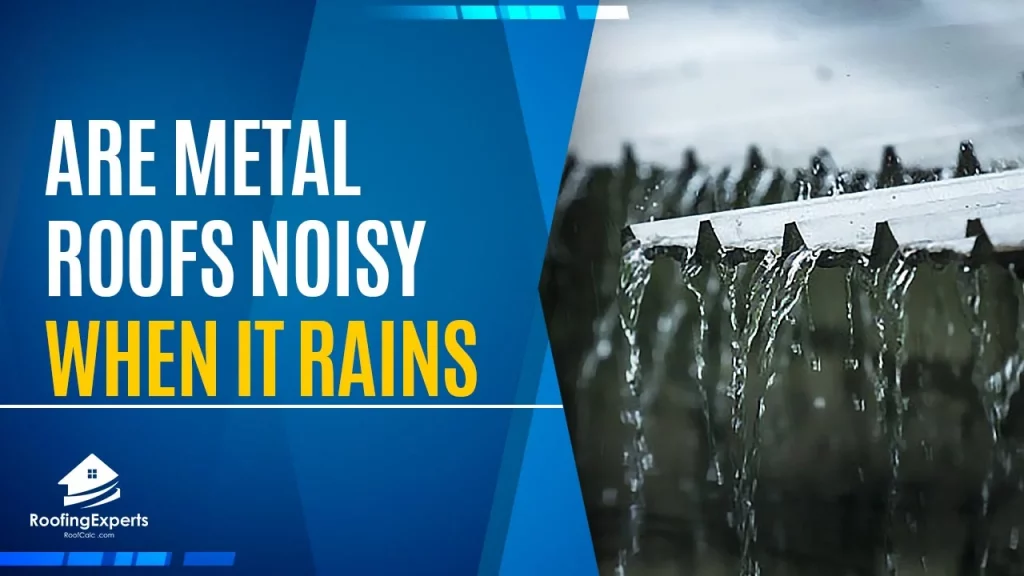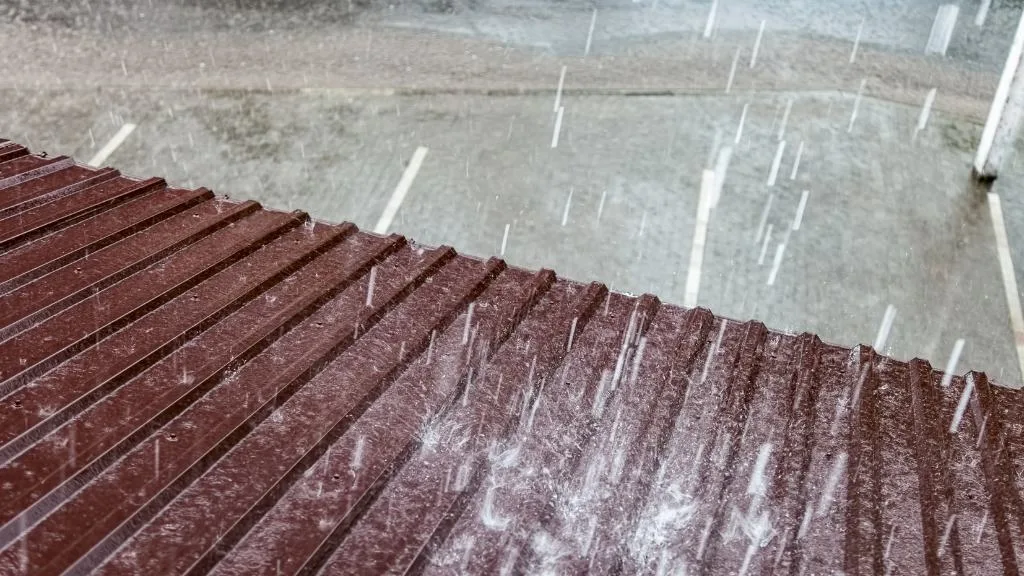
One of the most important decisions you will make for your home is what type of roofing material to use. There are many options, but the one that has become increasingly popular over the last few years is metal roofs. But will it be able to withstand any weather?
In this blog post we answer the question; Are Metal Roofs Noisy When It Rains so you can decide if you want to get one!
A metal roof can be an excellent choice for homeowners who want a durable and reliable product that will give them decades of worry-free service.
One concern some people have about installing a metal roof on their home is whether or not they will be noisy when it rains.
This article discusses the noise levels associated with different types of metal roofs and provides information about how homeowners can reduce noise if desired.
Why Rains Can Cause Noise on Metal Roofs
Metal roofs can make noises when it rains, so people are concerned about the noise levels produced when it rains on their roof.
There are several factors that cause this noise, but the most common reason is because metal roofs are designed to drain rain water quickly off of them in order to prevent roof corrosion or other damage from standing water.
This fast drainage often causes a rushing sound as the rainwater flows across the roof and falls over its edge.
Another common source of noise is the metal panels themselves. They will often vibrate and make a clanging or ringing sound when they get wet, especially if your roof has been expanded due to wind load.
This type of noise can be caused by air pockets in between the metal sheets that expand when it rains and cause them to hit together.
If either of these noises is bothersome, there are several things homeowners can do to reduce them.
Tips for Reducing Noise on Metal Roofs When It Rains
One method for reducing the noise on metal roofs is to install foam insulation between panels.
The sound of rain will be reduced because it cannot travel through dense insulating material, so you won’t hear the water rushing off your roof or hitting against its sheets when it falls over the edge.
This can also help reduce any air pockets that are causing a clanging sound.
Another option is to install a drainage strip along the roof’s edge where it meets your home or another structure such as a porch or patio cover.
This will help prevent any rain from running over this edge and onto other areas of your property, which can cause damage if water runs down walls, windowsills, foundation seams or into your home’s interior.
If neither of these options is effective, you can look at installing a metal roof with a textured surface rather than smooth one.
This will reduce the noise from rain as it hits your roof because its rough surface causes sound waves to dissipate instead of bouncing around and creating echoes or loud noises that may be bothersome when it rains.
However, if you are concerned about water getting trapped between this waterproofing product and your metal panels during heavy storms, there is another option for creating sound deadening barriers on your roof.
You can lay a sheet of high-density rubber over the entire surface area and then cover it with several layers of asphalt shingles or rolled roofing material before installing the metal panels themselves.
With these tips, homeowners can enjoy years of worry free service from their new metal roofs while enjoying peace and quiet during heavy rains.
Is a Metal Roof Right for Your Home?
Metal roofs come in many different forms. Each one has its own benefits and drawbacks that you need to keep in mind before making your final decision about which type of metal roof is right for your home.
Here are some of the most important factors to consider when buying a metal roof:
Type of Metal Used
One of the most important factors in choosing a material that has all the benefits you are looking for.
Some metal roofs come with an extremely durable surface, but lack insulation or won’t stand up to severe weather conditions like heavy rains and high winds.
Others may be able to hold off strong wind gusts, but aren’t as resistant to hail and flying debris.
The most popular types of metal roofs are:
Steel – Steel is very strong, durable and will last for decades with proper care. It can be designed to resist extreme weather conditions like heavy rains or high winds because it has a low moisture absorption rate.
However, there’s still the risk that condensation may form between each sheet so it’s not the best choice for homes in colder climates.
Copper – Copper has all of steel’s natural benefits, including durability and resistance to storms, but is also highly resistant to corrosion caused by moisture.
It can last 50 years or more when properly taken care of because its color will actually strengthen over time instead of fading. This makes it a great choice for homes in colder climates.
Aluminum – Aluminum is one of the most popular metals used because it’s lightweight, durable and doesn’t easily rust or corrode when exposed to moisture.
It can be painted different colors so homeowners have many choices for matching their home’s exterior design scheme. However, aluminum does tend to dent fairly easily.
Zinc – Zinc is another metal that can be painted different colors to enhance your home’s exterior design, but it also resists rust and corrosion better than steel or aluminum.
It may not stand up as well during extremely high winds because it isn’t quite as strong, but zinc roofs are easier to maintain over time compared to most other types of metals.
Flat or Low-Sloped
Metal roofs come in two basic styles. The first is flat, which can be installed on any home’s roof regardless of how steep it may be to increase the overall strength and durability that your metal roof will provide for years to come.
However, if you want a more traditional look with better energy efficiency than a flat roof can provide, low-sloped metal roofs are also available.
These use less material and create a more streamlined design that fits in naturally with the look of your home’s exterior while still providing all of the same benefits you get from a steel or aluminum roof.
Metal roofs are a great option for people living in areas with extreme weather, but their high-tech design can be noisy when it rains.
If you’re not sure if this is the right roofing material for your home, contact a roofing company to make an informed decision about which metal roofing system will best suit your needs.
Majority of roofing companies offer free consultations and onsite estimates!


